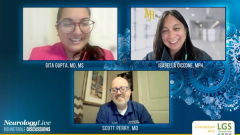
Enhancing Design of LGS Clinical Trials and Patient Care in Rare Epilepsies

Experts discussed strategies to improve LGS clinical trial design, better understand comorbidities in rare epilepsies, and foster collaboration across stakeholders. [WATCH TIME: 5 minutes]
WATCH TIME: 5 minutes | Captions are auto-generated and may contain errors.
Episodes in this series

Lennox-Gastaut syndrome (LGS) is a rare epilepsy syndrome that typically begins in childhood and is associated with frequent seizures, cognitive impairment, and long-term disability. Earlier this summer, the LGS Foundation hosted its 3rd biennial
In collaboration with
In this fifth episode, clinicians detailed the importance of building networks of care centers and standardized data collection to streamline patient identification and accelerate recruitment for clinical trials. The duo noted that capturing natural history data through registries can inform a better understanding of comorbidities and their impact on outcomes, allowing for more precise trial design. In addition, Perry and Gupta highlighted the need to develop treatments that target the underlying mechanisms of rare epilepsies, such as slow spike wave activity in LGS, rather than solely managing seizures.
Transcript edited for clarity.
Isabella Ciccone, MPH: How might other discussions at this meeting help guide the design and focus of clinical trials for LGS?
Scott Perry, MD: I think from a clinical trial standpoint, there are a few things that come out from it. One is just, gosh, the potential for easing the burden of clinical trials for identifying the patient. So, if we could get to this kind of established network of care centers where data is collected in a fairly similar way, that already gives us—I mean, many of us use similar electronic health records, for example—so that already gives us a really quick way to be able to identify good candidates for clinical trials, to accelerate recruitment, and hopefully get treatments out there faster. That's one thing.
I think also, by capturing data that way—in the natural history we talked about with the registry—that really informs a much better understanding of some of the comorbidities and the interaction of the comorbidities with the seizures, which then would allow us to maybe even design clinical trials better. Because we know seizures are not the only thing that we need to be looking at as outcomes. So better looking at some of these comorbidities and their outcomes, I think, comes from it as well.
And then I think if we get to the understanding of the slow spike wave and how we get to slow spike wave, maybe we could develop treatments that are actually specific to the process of developing slow spike wave and LGS, as opposed to what we have now, which are medicines to treat seizures that happen to be seen in LGS. But there's nothing specific about these medicines for this condition, you know? So all these more rare epilepsies we're dealing with now, we really want to get at the heart of the condition. If we can get to the heart of the condition, maybe we can correct the seizures and all the junk that comes with it, as opposed to just treating the symptom.
Isabella Ciccone, MPH: What was your favorite part of the 2025 LGS meeting? Were there any sessions that were really interesting—hot topics that you enjoyed learning more about?
Gita Gupta, MS, MS: I always love hearing from the parents, and I think that's in clinical medicine and research always our North Star—the parents, the families, the patients. And I really appreciate and respect that the parents are involved even in a research conference, because we don't always have that level of involvement at other conferences. And then the other thing that I really enjoyed was meeting people who are working in a totally different field, but still trying to help answer the same question, which is: How do we clearly define LGS? How do we take care of patients with LGS? How do we treat LGS? How do we improve the life and quality of life of children and their families? So, it's neat to see different people trying to answer the same questions, but in a different way.
Scott Perry, MD: I'll pick two things. The first—and I'm not picking it because I led it, and it was biased to pick it—but I thought the “Evidence Smackdown” was a lot of fun. I thought it was great to start out with. I don't even remember, I think we had like 8 categories or so and topics to start for that, and then to hear people debate it. And you got perspectives from different people—you got it from the physicians, you got it from the researchers, you got perspectives from the parents. And then to take the votes and, as a group, as a team, decide the direction of the foundation and the research—that was a lot of fun.
The second part that's always a favorite part is the time outside of the conference. I think the LGs Foundation did a great job of planning just the meals and stuff afterwards, which is a great time. We had about 100 people register for this, so to have 100 people there, sitting around the tables, and just talking to each other outside of the conference is always good. Forming those kinds of relationships across all the attendees is important to getting the kind of work done that we want to get done. So, I thought that was great.
Newsletter
Keep your finger on the pulse of neurology—subscribe to NeurologyLive for expert interviews, new data, and breakthrough treatment updates.











